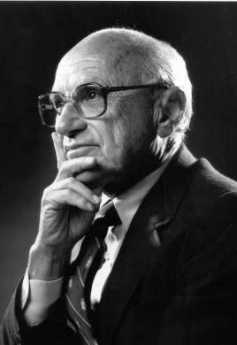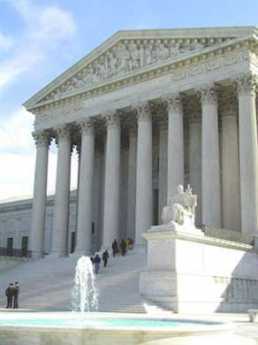Related Topics
Reminiscences
"The past is never dead. It's not even past." -- William Faulkner, Requiem for a Nun
Medical (#2)
New topic 2019-05-24 23:10:33 description
School Vouchers (7)

|
| Milton Friedman |
S chool vouchers might seem unrelated to the struggle to enact Medical Savings Account legislation, but Milton Friedman June 9, 2005 article in the Wall Street Journal suggests that resistance to both ideas comes from the same source. That's appealing, so let's quote the Nobel Prize winner at length. He's speaking of the 23-year interval since the publication of Paul Copperman's book A Nation at Risk:

|
| Supreme Court |
"Throughout this long period, we have been repeatedly frustrated by the gulf between the clear and present need, the burning desire of parents to have more control over the schooling of their children, on the one hand, and the adamant and effective opposition of trade union leaders and educational administrators to any change that would in any way reduce their control of the educational system.
"We have been involved in two initiatives in California to enact a statewide voucher system(in 1993 and 2000). In both cases, the initiatives were carefully drawn up, and the voucher sums moderate. In both cases, nine months or so before the election, public opinion polls recorded a sizable majority in favor of the initiative. In addition, of course, there was a sizable group of fervent supporters, whose hopes ran high of finally getting control of their children's schooling. In each case, about six months before the election, the voucher opponents launched a well-financed and thoroughly unscrupulous campaign against the initiative. Television ads blared that vouchers would break the budget, whereas, in fact, they would reduce spending since the proposed voucher was to be only a fraction of what government was spending per student. Teachers were induced to send home with their students misleading propaganda against the initiative. Dirty tricks of every variety were financed from a very deep purse. The result was to convert the initial majority into a landslide defeat. This has also occurred in Washington state, Colorado and Michigan. Opposition like this explains why progress has been so slow in such a good cause.
"The good news is that, despite these setbacks, public interest in and support for vouchers and tax credits continues to grow. Legislative proposals to channel government funds directly to students rather than to schools are under consideration in something like 20 states. Sooner or later there will be a breakthrough; we shall get a universal voucher plan in one or more states. When we do, a competitive private educational market serving parents who are free to choose the school they believe best for each child will demonstrate how it can revolutionize schooling."
Milton Friedman thus advocates three things: Medical Savings Accounts, School Vouchers, and channeling public funds directly to citizens rather than to the institutions which serve them. As an economist, he seems primarily interested in breaking up the financial integration of government and institutions, with school vouchers as a demonstration. As a physician, I was mainly interested in the advantages of Medical Savings Accounts themselves. The theoretical advantage of keeping governments and institutions at financial arms-length was for me only a helpful navigational guideline.
Antitrust agencies have been uneasy for a century about this matter, which lawyers call "vertical integration". The U.S. Supreme Court has repeatedly pondered vertical integration between corporations and suppliers, but so far has drawn back from prohibiting it. The State Oil case suggests the Court perceives such economic concentration is so commonly harmful to the participants that most will learn to avoid it without legal interference. The possibility, after all, does exist that in some circumstances integration might be of some value to the public. Along those lines, an argument could be advanced that paying hospitals directly reduces administrative costs, as compared with sending bills to preoccupied patients. Or the management of hospitals might be more flexible if revenue comes in periodic government payments without economic and seasonal volatility. These and other arguments against the MSA might be examined on their merits, but such arguments have almost never been discussed.
Medical Savings Accounts and school vouchers have encountered the same sort of bewildering guerrilla warfare. Warcries abound, but rarely plausible arguments, and never direct negotiation. Since both proposals are just paperwork reforms, their well-intentioned advocates more astonished at the virulence of the opposition than disposed to imitate it. Somebody is protesting too much. That's all we could see. The common issue between the two reform proposal is whether government funds should flow directly to institutions, or whether it may also flow to individuals, who would then choose between competing institutions. Furthermore, the opponents of reform, which we would have to suppose are the institutions themselves, seem bitterly opposed to any experiments or demonstration projects, as if they recognize that the economic facts will undermine their resistance.
Originally published: Wednesday, June 21, 2006; most-recently modified: Wednesday, June 05, 2019